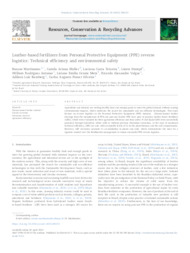Leather-based fertilizers from Personal Protective Equipment (PPE) reverse logistics: Technical efficiency and environmental safety.
Leather-based fertilizers from Personal Protective Equipment (PPE) reverse logistics: Technical efficiency and environmental safety.
Author(s): MARTINAZZO, R.; MULLER, C. A.; TEIXEIRA, L. C.; STUMPF, L.; ANTUNES, w. r.; METZ, L. E. G.; VALGAS, R. A.; BAMBERG, A. L.; SILVEIRA, C. A. P.
Summary: Agriculture and industry are seeking healthy food and enough goods to meet the global demand without causing environmental impacts, which motivates the search for sustainable and eco-efficient technologies. This study focuses on reverse logistics in the Personal Protective Equipment (PPE) industry. Chrome-tanned leather shavings from the manufacture of PPE and post-use leather PPE were used to produce leather-based fertilizers (LBFs), which were evaluated for their agronomic efficiency and food safety. N-rich liquid LBFs were successfully produced through hydrolysis, either with or without previous chromium extraction. At the dose of maximum technical efficiency, LBFs are safe, with acceptable levels of Cr in the plant biomass and the soil compartments. However, LBF overdoses promote Cr accumulation in plants and soils, which demonstrates the need for a rigorous control over the fertilization management to ensure successful PPE reverse logistics.
Publication year: 2023
Types of publication: Journal article
Observation
Some of Embrapa's publications are published as ePub files. To read them, use or download one of the following free software options to your computer or mobile device. Android: Google Play Books; IOS: iBooks; Windows and Linux: Calibre.
Access other publications
Access the Agricultural Research Database (BDPA) to consult Embrapa's full library collection and records.
Visit Embrapa Bookstore to purchase books and other publications sold by Embrapa.

